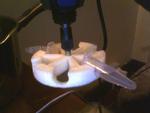 These days people are fiddling with anything that can be made digital, and one of the more interesting digitizations recently is biology! DNA, those tiny molecular strands that define us all, are increasingly being investigated by, well, hackers. BBC News reports on this phenomenon, which has grown recently aided by technological developments.
These days people are fiddling with anything that can be made digital, and one of the more interesting digitizations recently is biology! DNA, those tiny molecular strands that define us all, are increasingly being investigated by, well, hackers. BBC News reports on this phenomenon, which has grown recently aided by technological developments. The idea is to manipulate DNA by cutting and pasting different genetic instructions together. This can be done by isolating DNA, splicing and joining strands together and other mechanical techniques. DNA strands can be found within other organisms or even purchased from online DNA distributors.
But home biohacking will require equipment, software and processes. These are all being developed based on existing technology, including 3D printing. BBC reports Irish postgrad Cathal Garvey produced a kitchen centrifuge design based on the popular Dremel power tool, suitable for 3D printing. The centrifuge design has been loaded to Shapeways, where anyone can quickly order one.
We can imagine entire biohacking kits being manufactured in the same way that Ponoko is manufacturing MakerBot 3D printers.

